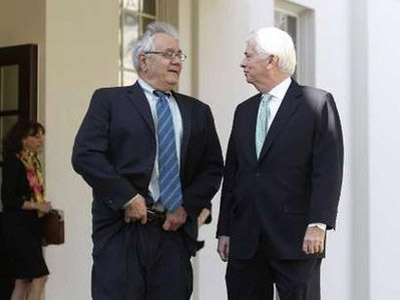US: Why Can’t We Fire Failed Regulators? – by Mark A. Calabria
 As Congress returns from its weeklong July 4 break, the Senate is poised to vote on the Dodd-Frank financial regulation bill. With the recent House passage, a Senate vote is all that stands between the bill and the president.
As Congress returns from its weeklong July 4 break, the Senate is poised to vote on the Dodd-Frank financial regulation bill. With the recent House passage, a Senate vote is all that stands between the bill and the president.
While people continue to debate the causes of the financial crisis, there is one factor that appears to be widely agreed upon: the absolute failure of banking regulators to do their job.
The Dodd-Frank bill claims to address this failure by eliminating agencies, such as the Office of Thrift Supervision, or transferring regulatory responsibilities, such as consumer protection, from existing agencies. What the press releases leave out is that all of the same bureaucrats behind the failures also move to the new agencies along with their previous responsibilities.
In debating against the creation of an independent consumer protection bureau, Republicans argued that all of the existing bank regulators have warned against separating consumer protection from safety and soundness regulation. They pointed out that this reflected a concern of the regulators that such separation would undermine bank safety and soundness.
Rep. Barney Frank’s response was that the current regulators lack credibility on the issue. Frank went as far as to say that “the Fed has a terrible record of consumer protection.”
Frank’s solution is to therefore transfer the Fed’s consumer duties to a new regulator. However, the Dodd-Frank bill clearly states in Section 1064 that “all employees of the Board of Governors identified … shall be transferred to the Bureau for employment.”
If one believes that such employees have “a terrible record,” then what exactly is the rationale for keeping said employees?
Such transfers are not limited to consumer protection. Although there is little evidence that the Office of Thrift Supervision (OTS) performed any worse, or better, than other bank regulators, the Dodd-Frank bill eliminates the OTS, moving its powers to the Office of the Comptroller of the Currency.
But Section 322 of the bill guarantees that “all employees of the Office of Thrift Supervision shall be transferred to the Office of the Comptroller of the Currency” or to the FDIC. Once again, if the OTC is a failed regulator, then why are we not firing its employees? Or at least making them re-apply for their jobs.
Some might argue that firing regulators would erode the trade-off that government employees make between job security and salary. For this to be true, one would expect to find government salaries to be lower than those of the private sector. Yet what we find is the opposite, especially when it comes to financial regulators.
While the typical American household has to manage to get by on just over $50,000 a year (2008), the average compensation, not including benefits, for federal bank regulators is over $115,000, with some agencies, such as the Securities and Exchange Commission, seeing average annual compensation of over $130,000.
Not only do bank regulators get to keep their jobs regardless of their performance, they are rewarded with six-figure salaries. One of the most harmful aspects of the bank bailouts was the rewarding of irresponsible private-sector behavior. Ultimately more damaging, however, will be the continued rewarding of failure on the part of government.
There is probably no regulator who was more asleep at the wheel than the Federal Reserve Bank of New York. Yet, in what must be a new twist on the Peter Principle, the New York Fed’s leadership during the crisis, Timothy Geithner, was promoted to Treasury secretary and placed in charge of Obama’s financial reform efforts.
But then such a promotion, in the face of repeated failure, pales in comparison to the reappointment of Ben Bernanke as Federal Reserve chair.
The sad truth is that the Dodd-Frank bill is in keeping with a long tradition: that government exists to serve special interests rather than provide for the common good. And when it comes to special interests, there is perhaps no more powerful special interest than government employees.
In addition to ignoring the government policies that drove the financial crisis, the Dodd-Frank bill places protecting government employees over protecting both the taxpayer and our financial system. At a time when millions of Americans have lost their jobs, generally by no fault of their own, protecting the jobs of failed bank regulators only adds insult to injury.
No comments:
Post a Comment